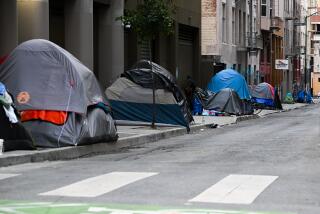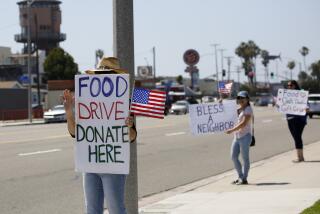Begging the Question : When Someone Hits You Up for a Handout, Do You Pass the Buck?
- Share via
NOT TOO LONG AGO, “middle class” was among the worst labels you could slap on people. It meant conventional, conservative in the most instinctual, un-ideological sense, given to safe choices, if choices had to be made at all.
But now I’m beginning to appreciate some of the joys of being middle-class. I don’t mean mowing the lawn and grounding the kids: The water shortage and MTV have rendered those activities of an earlier middle class obsolete. But people who are neither too rich nor too poor get to make some of life’s most interesting choices: state college or UC; a third VCR or an espresso machine that makes real cappuccino, and most interesting, I think, what to do when beggars ask you for money.
We now take it for granted that there will be homeless people outside the Gelson’s in the Valley. It seems goofily normal that, after a dinner at one of Santa Monica’s spiffy new ocean-side restaurants, you must, while waiting for the valet to retrieve your car, share the street with someone for whom alfresco dining has lost all its charm.
It doesn’t seem to occur to us that this wasn’t the way things were, before Ronald Reagan made the safety net as imaginary a concept as, say, net profits. The same change , incidentally, has occurred in Maggie Thatcher’s England. For the first time in the postwar era, what we used to call bums are now camping under the bridges of the Thames, a few yards away from luxury hotels. France, Sweden, Holland, Italy don’t have a homeless problem. But people in those countries have to grow up speaking foreign languages.
Politics aside, there is this question of what to do about homeless people. Not the social question--shelters or job training, mental health community centers or free food--but the personal question: Do you give money to street people or don’t you?
A former girlfriend and I found this to be one of those divisive issues that enable each person to discover deep character flaws in the other. There we’d be, walking out of Vons around midnight, and a very frail, very old woman would approach us, her quavering voice asking if we’d like to buy a rose. One of us would go all gooey and give the woman a dollar, telling her to keep the rose. The other one would scoff, claiming that the woman was clearly running some kind of scam.
As it happened, I was the gooey one. But now I’m becoming aware of feelings less likely to be shared by Mother Teresa. Watching a bearded man in bright sunlight struggle to go bipedal--taking a few halting steps outside a bar, slumping at a bus bench, catching a snooze in the shadow of a trash can, then starting up again--I found myself thinking “Grow up!”
Not “Get a job.” That’s too prescriptive, too, well, yes, middle-class. But the guy was irritating me by acting out a drama of sloppy helplessness that most of us left behind in late toddlerhood.
So what’s a person to do? Is there some central office that daily dispatches people with “Will Work 4 Food” signs to prime locations and takes a cut of the action? Does that octogenarian woman shivering in the midnight dew outside of Vons really take a limo home to a Brentwood mansion, cackling to her driver, “They bought the roses! They bought the roses!”?
We are lucky, twice so. Lucky if we areat least middle-class, and lucky we are here, where this question is still a matter of individual choice. In New York, it is now illegal to beg for money in the subways unless you are playing a musical instrument (buy Yamaha stock). In New York, where street-tough men at busy intersections race to smear greasy cloths on your windshield and then demand payment for the “service,” city officials sternly advise folks with money not to give it to folks without.
Everyone I know has worked out an individual policy. A woman gives money only when not asked--a reward, it seems to me, for lack of enterprise, but to her an expression of gratitude for not being hassled. Some people reward cleverness or originality of approach (“I just need a quarter more to buy USA Today”); others use a more arcane system of judging (so many points for sincerity, spontaneity, degree of difficulty).
Some blessed souls say it’s our duty to give to everyone in need, without judging the need. Me, I tend to be generous when I’m in a good mood (when generosity makes me feel even better), less so when I feel victimized by the fools and jerks of the world. And I have this rule: I don’t give if I’m asked at a time when I’m already reaching for my money, as when approaching the Please-Pay-First room at the self-service gas station. To the mendicant, it probably seems prudent to pounce when the funds are close to hand. To me, it feels like a trap.
New York’s experience suggests that as middle-class people evolve their policies, street people evolve their tactics. Each hardens in response to the other, like dueling vats of quick-drying cement. The good news is that we have plenty of time, each of us, to devise the perfect strategy. The larger society will step in only if the bottom falls out of the economy and the beggars start outnumbering the middle class.
That’s when Donald Sterling, or Donald Trump, will be selling the roses outside Vons. And, hopefully, I’ll be buying.
More to Read
Sign up for Essential California
The most important California stories and recommendations in your inbox every morning.
You may occasionally receive promotional content from the Los Angeles Times.






